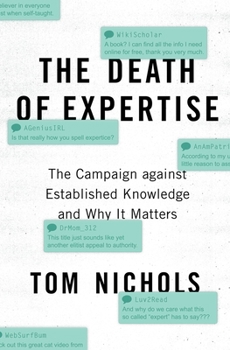The Death Of Expertise: The Campaign Against Established Knowledge and Why it Matters
Select Format
Select Condition 
Book Overview
Technology and increasing levels of education have exposed people to more information than ever before. These societal gains, however, have also helped fuel a surge in narcissistic and misguided intellectual egalitarianism that has crippled informed debates on any number of issues. Today, everyone knows everything: with only a quick trip through WebMD or Wikipedia, average citizens believe themselves to be on an equal intellectual footing with doctors and diplomats. All voices, even the most ridiculous, demand to be taken with equal seriousness, and any claim to the contrary is dismissed as undemocratic elitism. Tom Nichols' The Death of Expertise shows how this rejection of experts has occurred: the openness of the internet, the emergence of a customer satisfaction model in higher education, and the transformation of the news industry into a 24-hour entertainment machine, among other reasons. Paradoxically, the increasingly democratic dissemination of information, rather than producing an educated public, has instead created an army of ill-informed and angry citizens who denounce intellectual achievement. When ordinary citizens believe that no one knows more than anyone else, democratic institutions themselves are in danger of falling either to populism or to technocracy or, in the worst case, a combination of both. An update to the 2017breakout hit, the paperback edition of The Death of Expertise provides a new foreword to cover the alarming exacerbation of these trends in the aftermath of Donald Trump's election. Judging from events on the ground since it first published, The Death of Expertise issues a warning about the stability and survival of modern democracy in the Information Age that is even more important today.
Format:Paperback
Language:English
ISBN:0190865970
ISBN13:9780190865979
Release Date:October 2018
Publisher:Oxford University Press
Length:280 Pages
Weight:0.75 lbs.
Dimensions:0.7" x 5.5" x 8.2"
Customer Reviews
2 ratings
Resist the Cult of Ignorance
Published by Randy Ehrler , 1 day ago
Tom Nichols’ The Death of Expertise really made me think about why so many people have lost trust in experts. He explains how the internet makes all information seem equal, how universities now treat students like customers, and how the news focuses more on entertainment than truth. Instead of making us more informed, easy access to information has led many to reject expertise, believing all opinions carry the same weight, no matter the knowledge behind them.
I appreciated that Nichols doesn’t just blame the public—he also points out that some experts have talked down to others, creating frustration and distrust. He argues that we need public intellectuals who share knowledge with humility, not superiority. What stood out most to me was his warning: our world is complex, and ignoring expertise can have serious consequences. Just because we don’t fully understand someone’s work doesn’t mean it isn’t essential. Dismissing experts may feel good in the moment, but it can lead to real problems down the road. An essential message for our times.
Rather elitist, but interesting nonetheless
Published by Zella Paige , 1 year ago
This is an incredibly interesting, informative, and well-argued read. The book has the vibe of a well-researched and well-supported opinion piece. As such there are a couple of short sections of the book that I entirely disagree with the author on. Upon reflection, I found it interesting that those sections are supported with anecdotal rather than peer-reviewed evidence. (The two sections I'm referring to only account for about 10 pages of the book as a whole, so overwhelming I agree with Nichols and his reasoning.)
As someone outside academia, who would be classified as a layperson, some sections of this book felt alienating. Once I pushed passed that alienating feeling however I found it to be an incredibly rewarding read. As Nichols points out,
"It's not supposed to be easy." (76)
Nichols is specifically referring to the experience of receiving a college education with this sentence, but I would argue that this sentiment should and could be extrapolated to all elements of furthering education.
I think the book would have been greatly improved by collaboration with even a single additional contributor. Specifically because in the 6th chapter of the book Nichols talks at some length about the cross-expertise violations.
"[Experts] see their expert knowledge as a license to hold court about anything. (Again, I cannot cast the first stone here.)"
Despite this marked level of self-awareness on page 188, Nichols, an expert on National Security Affairs and more broadly politics, did not choose to collaborate with a communications or public affairs expert. This book was initially formulated as an article, in which case it makes sense for Nichols to be the only contributor. As it transitioned from article to book there should have been additional voices included in the writing process. In no way does this lack of additional authors take away from the validity of the book or the information it presents. I do think however that additional contributing voices could have taken this book from good to great.
I will absolutely be recommending this book (if with a few caveats) and will likely reread it myself at least once. I also left this book with a much longer reading list than prior to cracking the spine, which I think is the mark of a well-referenced read. Ultimately I feel like a more well-informed citizen for having taken hours to read The Death of Expertise.






